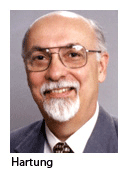With Dr. Bruce Hartung
Q: I write this question to you anonymously. … I am scared. My church job is in jeopardy and this is why.
I am getting more and more anxious about going to work. Every day frightens me more. I drink a little and that calms me down. I pray a lot and sometimes that calms me down too.
So far I have managed to stay afloat, but I am scared I am on the edge of what I can manage. If I go to the church leaders (I am not saying what kind of a church job I do) they might think I am not a good Christian and they will fire me. If I go to the district people they might pull me from the roster. I even hesitate going to my marriage partner (I am not saying my gender). … There is no place I can go, so I am left trying to work this out by myself. I fear I am not going to be able to work this out by myself.
I read your column most of the time. Sometimes you give good advice. Do you have some for me?
A: I appreciate your courage in writing. Usually I do not address anonymous communication in this column, but once in a while I do. This is one of those “do” times. I pray that my response is “good advice” that can be used by you and  every church worker who fears that seeking help will somehow come back to haunt them in a negative way.
every church worker who fears that seeking help will somehow come back to haunt them in a negative way.
Because you are baptized, you are never actually in a position that you must work anything like this out all by yourself. Christ has promised His presence and His Holy Spirit; the body of Christ — the community into which you were placed when you were baptized — surrounds you. You are in no way alone. But it does not seem so to you. So let’s start with where you can go.
Finding a place to turn to for help is important because, as you have indicated, you are concerned that left to yourself you will not be able to work this out. This is actually so for many of us. Left to our own devices we flounder. That is why our baptism is so crucial: we are not left to our own devices.
If you are in the Concordia Health Plan (CHP), you have mental health and substance abuse benefits. Check your member ID card for contact information. In addition, all CHP members have access to an Employee Assistance Program (EAP) through CIGNA Behavioral Health which includes six free visits and unlimited phone calls to EAP counselors. Call 866-726-5267 to contact the CIGNA EAP. You will be talking confidentially to a clinical representative. Tell that person about your situation and that you are looking for a Christian counselor — someone who shares your belief in Christ as Savior. She or he will offer you a list of people to contact.
Call several of these folks. When you talk to one who seems to connect effectively with you, make an appointment soon. Then you are on your way. All this is totally anonymous — neither the LCMS nor Concordia Plans will be contacted in any way. It is a “safe space.”
If there are other resources in your community that you would be willing to contact to share your concerns so that they might make recommendations to help you, you might also make such contacts. But it seems like the anonymity question is really crucial now.
I cannot speak to the question of whether your church leaders, district “people,” or even your spouse are “safe spaces” for you. I hope that eventually you would find some of them to be so.
It is a mark of insight, wisdom and courage to reach out for assistance. In fact, I believe this would be the Holy Spirit’s work in you.
And when you call for counseling assistance, please feel free to let me know how things are going for you — still anonymously, even.
The Rev. Bruce M. Hartung, Ph.D., is the associate dean of Ministerial Formation and director of the M.Div. and Alternate Route programs at Concordia Seminary, St. Louis. He can be reached at hartungb@csl.edu.
Posted Nov. 17, 2011



